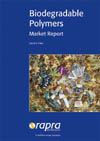Biodegradable Polymers Book

Biodegradable polymers have experienced strong growth over the last three years and are set to make further inroads into markets traditionally dominated by conventional thermoplastics in future.
Demand is being driven by a number of factors.
The cost of biodegradable polymers has come down considerably over the last three years while at the same time standard thermoplastic prices have increased considerably. Now, some classes of biodegradable polymers are price competitive with polymers such as PET.
The biodegradable polymers industry itself has established an agreed framework for testing and certification and there is growing political pressure in developed countries to reduce packaging waste and develop a composting infrastructure. Biodegradable polymer producers have also invested in product and process improvements. Finally, consumers and brand owners are beginning to recognise the benefits of sustainable or green packaging.
Four main classes of biodegradable polymers are analysed in this report, polylactic acid (PLA), starch-based polymers, synthetic biodegradable polymers, such as aromatic aliphatic co-polyesters, and polyhydroxyalkanoates (PHA). The report analyses their key performance properties, applications development, market drivers and future prospects. Each product section also contains an estimate of market size by world region and end use market, plus forecasts to 2010. There is also an analysis of key suppliers and their products.
Click here for further information
Terms
While we only use edited and approved content for Azthena
answers, it may on occasions provide incorrect responses.
Please confirm any data provided with the related suppliers or
authors. We do not provide medical advice, if you search for
medical information you must always consult a medical
professional before acting on any information provided.
Your questions, but not your email details will be shared with
OpenAI and retained for 30 days in accordance with their
privacy principles.
Please do not ask questions that use sensitive or confidential
information.
Read the full Terms & Conditions.